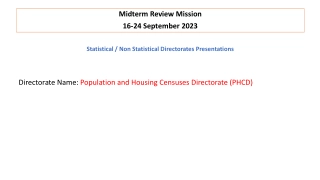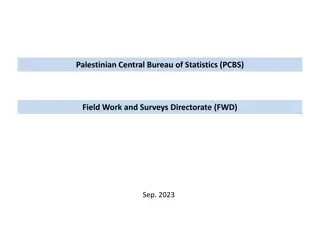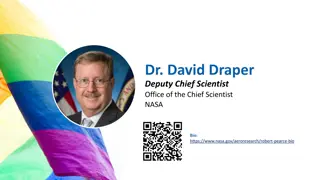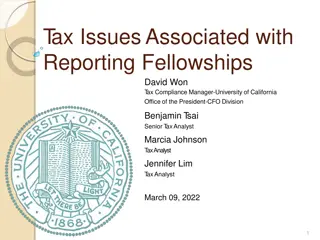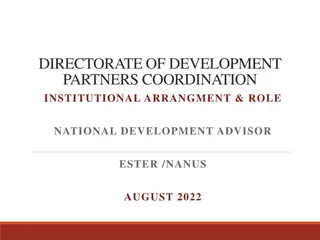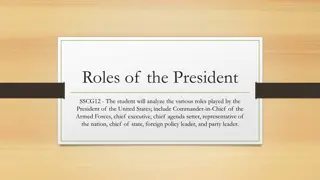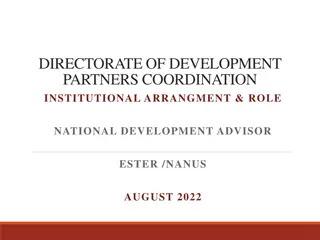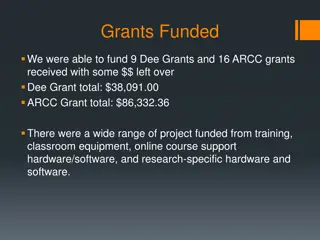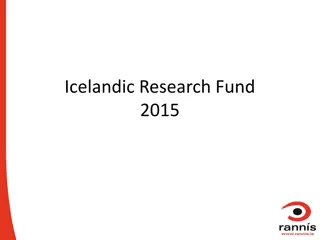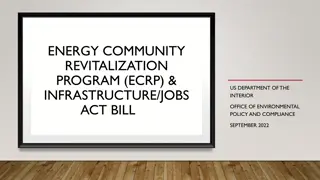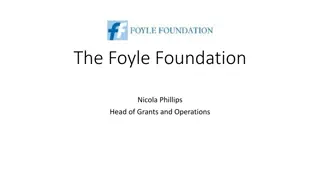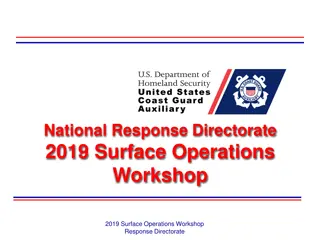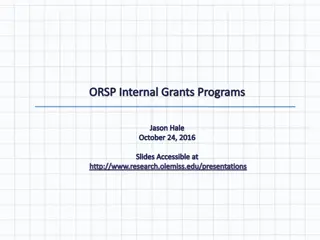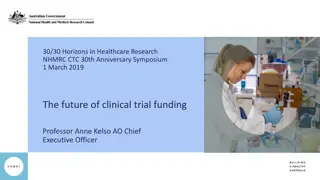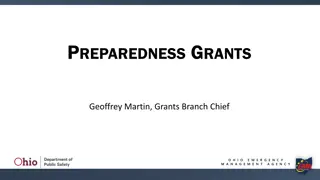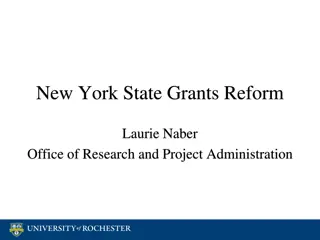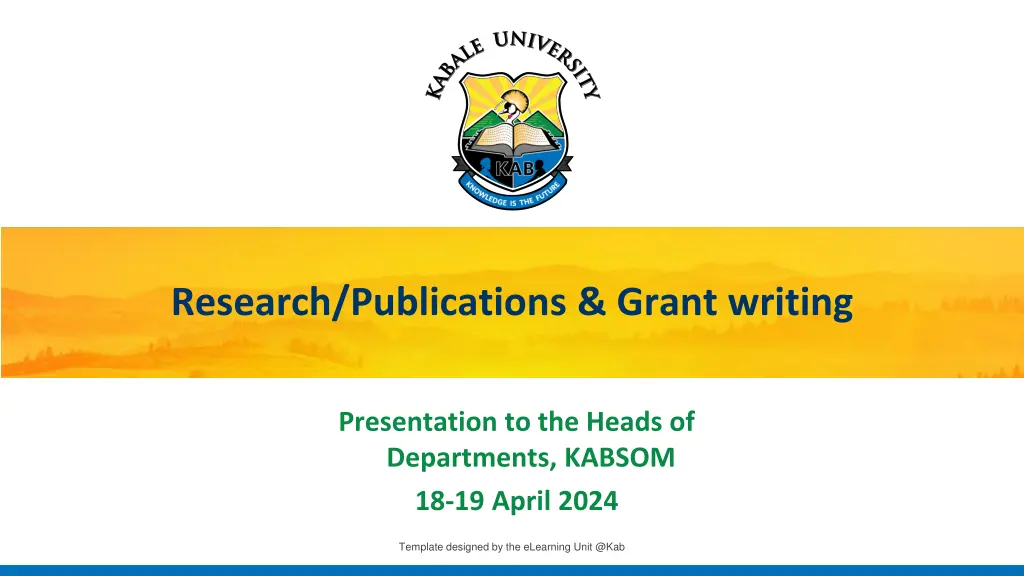
Empowering Research and Grants at KABSOM: A Strategic Overview
Explore how the Directorate of Research and Grants at KABSOM harmonizes research activities, secures funding, and fosters innovation. Learn about key roles, governance, and the research agenda aimed at strengthening the university's research and innovation capabilities for societal impact.
Download Presentation

Please find below an Image/Link to download the presentation.
The content on the website is provided AS IS for your information and personal use only. It may not be sold, licensed, or shared on other websites without obtaining consent from the author. If you encounter any issues during the download, it is possible that the publisher has removed the file from their server.
You are allowed to download the files provided on this website for personal or commercial use, subject to the condition that they are used lawfully. All files are the property of their respective owners.
The content on the website is provided AS IS for your information and personal use only. It may not be sold, licensed, or shared on other websites without obtaining consent from the author.
E N D
Presentation Transcript
Research/Publications & Grant writing Presentation to the Heads of Departments, KABSOM 18-19 April 2024 Template designed by the eLearning Unit @Kab
Introduce the Directorate of Research and Grants i. Outline how we work together ii. Explore some sources of funding available to all departments iii. Content 2
The mandate of DRG is to harmonize and coordinate research and publication activities at the University. Roles, we contribute to: create an environment and culture of research and innovation mobilise resources for research and innovation disseminate research outputs and innovations build partnerships with donors, industry, communities and researchers to promote RI Directorate of Research and Grants (DRG) 1. 2. 3. 4. 3
Governance of the Directorate of Research and Grants Directorate. i. Research and Publications Advisory Board (RPAB) i. Directorate of Research and Grants (DRG) Research Technical Review Committee (RTRC) ii. Faculty/School/Institute Research and Publication Committees (FRPC) iii. 4
1. Create an environment and culture of research and innovation 5 5 Template by the eLearning Unit @Kab
Research Agenda 1. Research and Innovation Strategic Plan 2021-2025 Develop and promote policies and strategies for RI 2. Research and Innovation Policy 3. Intellectual Property Policy 4. KAB Research Ethics Committee 5. 6
The roadmap for research and innovations at KAB as a contribution to the KAB Strategic Plan 2021 2025 - SO5: Strengthen research, innovation and publication capacity of the University Developed through a bottom up approach based on the interests of the faculties and guidance from KAB and national strategies KAB- Research Agenda Objective is to increase the production of relevant and impactful knowledge and services through research and innovations that can contribute to the wellbeing of society. Captures 14 Thematic Areas of research that are prioritized in Research and Innovation efforts 7
Purpose To increase the Number and Impact of Research and Innovations at Kabale University as a means of Demonstrating its Relevance to society . KAB-Research and Innovations strategic plan Pillars: i. Building and strengthening staff and students capacity for research i. Increasing resources for RI from both domestic and external sources. ii. Building strong, resilient and productive RI collaborations. iii. Improving the infrastructure and environment for research and publications. iv. 8 Promotion of multi-disciplinary research. v.
The purpose of the policy is to strengthen the research and innovation ecosystem of KAB and increase its contribution to the national and global knowledge and innovation economy. Research and Innovation Policy Covers 14 Policy Areass including Governance, funding, ethics, integrity, discrimination etc. Clarifies processes and procedures for Implementation, Monitoring and Evaluation, and Review of the Policy 9
Deals with the ownership, commercial and social exploitation and distribution of the benefits accruing from commercialized IPs created at KAB. Intellectual Property (IP) Policy Highlights key principles for the conduct of RI at KAB, such as Academic freedom and fair benefication Provides mechanisms for management of IPs covering ownership, commercialization and benefit sharing 10
All research in Uganda must be approved by an accredited Research Ethics Committee (REC), and posses a permit issued by the Uganda National Council for Science and Technology (UNCST) KAB-Research Ethics Committee KAB University has its own REC advising and providing a quality control measure for research and innovations from Kabale University and beyond. KAB-REC constituted with participation by external representatives, including the Chair. 11
2. Mobilise resources for research and innovation 12 12 Template by the eLearning Unit @Kab
KAB University Council allocates funding for research in faculties and the DRG. DRG administers these funds, including a 1 billion Research and Innovation Fund Internal funding Available for teams KAB Researchers of different levels, students, other collaborators Continuously open call for proposals and decisions made on a quarterly basis 13
KAB staff apply for funding from external sources (not allocated by University Council) All staff can contribute Management, Administrative, Academic and Students External funding DRG supports subscription to a database for identifying funding sources (Funds Beeline); training in grant writing; tracking progress DRG can also lead or support specific initiatives to mobilise funds 14
Research funds by source 15 15
3. Disseminate research outputs and innovations 16 16 Template by the eLearning Unit @Kab
Tracking publications outputs 17
African Journal of Governance and Public Leadership (AJoGPL) - quarterly journal for Public Administration, Management, Governance, Public Policy, Public Leadership and related fields. Publication of KAB Research Journals Kabale University Interdisciplinary Research Journal (KURJ) - multidisciplinary journal accepting high quality original research articles, letters and commentaries - Accessible for promoting KAB RI. 18
Support Faculties in research dissemination i. FASS Dissemination seminar 14thJune 2024, call for proposals announcement today i. Research Dissemination workshops FOS African Women Workshop in Algebra 1-5 July 2024 ii. 19
4. Build partnerships with donors, industry, communities and researchers to promote RI 20 20 Template by the eLearning Unit @Kab
Partnership projects e.g. NISHATI partnership project funded by the EU Erasmus+ Fund 10 universities including KAB; Cambridge Conservation Initiative; UNDP, University of Exeter, RI Strategic plan - objective 5 Attendance of conferences and donor meetings; European Union Delegation, Mountains of the Moon University 21
How we work together 22 22 Template by the eLearning Unit @Kab
Represented on the Research and Publications Advisory Board Faculty Research and Publication Committees Contribution to the Research Technical Review Panel Feed information on Research, Innovations and Dissemination plans Represented on KAB-REC 23
Apply for grants from Internal Funds Build teams to apply for external grants ask for support in terms of tools, information, contacts Individual contacts Inform DRG of the outcomes of your fundraising efforts Share with DRG your publications Request and participate in training and capacity building 24
Explore a source of funding available to all departments The Erasmus+ programme of the European Union 25 25 Template by the eLearning Unit @Kab
What is it? The EU's programme to support education, training, youth and sport Funding for programmes, projects and scholarships Fosters EU-EU and EU-international cooperation International projects Are based on partnerships Meet a need at your institution / in your country 26 26
27 27
28 28
International Credit Mobility Erasmus Mundus: Joint Masters and Design Measures Capacity Building in Higher Education (CBHE) 1. 2. 3. Main funding lines available to KAB Earmarked Euro 570 million for 2021-2027, 49% of it to International Mobility Project; 28% to Capacity building in higher education and 8% to Joint Masters. Calls coming in November 2024 with deadlines in February 2025 29
1. International credit mobility Message to Universities: MAIN FEATURES Short-term higher education mobility for students, academic and administrative staff All levels: Bachelor, Master and PhD candidates for African students (only staff and PhD candidates from Europe to Africa) Mobility in any subject or academic discipline Duration: 2-3 years projects Also supports traineeships for students and training for staff Study periods and traineeships of 2 12 months (5 days to 2 months for staff) Blended mobility (physical mobility of 5 30 days + virtual component) Begin to engage with European partner universities able to apply Message to students: only possible if your university has an agreement with a European one
International Credit Mobility in practice The applicant is a higher education institution in Europe This action is managed by the Erasmus+ National Agency where the applicant is located The European University and its partner institution in a non-associated country sign an inter-institutional agreement. A grant agreement links the European University and its E+ national agency. A learning learning/mobility agreement links the participant to the sending and hosting institutions.
Urgent next steps 1. Do you have a need for capacity building that can be addressed through an exchange programme with a European University? If you are interested, let us know (chief- drg@kab.ac.ug) and we will journey with you. 2. Do you know a person/people in an EU or associated third country able to co- develop a project with you? 3. Read the guidelines to Erasmus, look at the FAQs, look at reports of previous projects. 32 32
Thank you! Thoughts? Suggestions? chief-drg@kab.ac.ug 33 33 Template by the eLearning Unit @Kab

